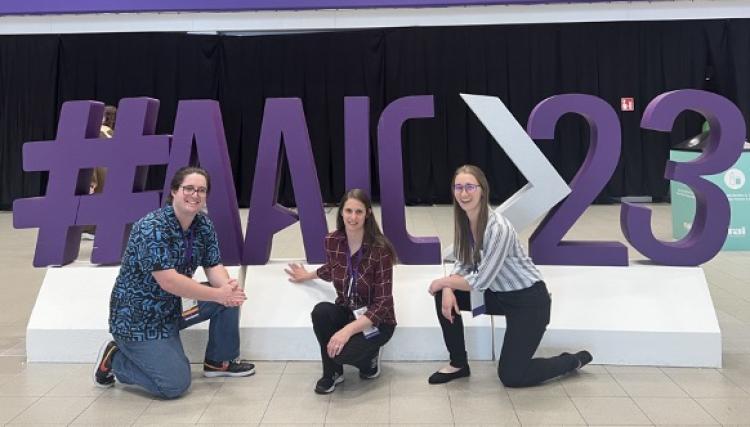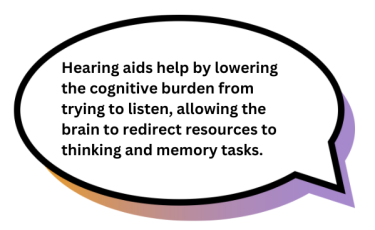
Angela Hanson, MD, (center) a MBWC geriatric physician and researcher, and Hanson lab team members Nate Ashford (left) and Kristen Farris (right) attended the AAIC2023 conference in Amsterdam!
By Kristen Farris, Research Coordinator, Division of Gerontology & Geriatric Medicine, UW Medicine
As published in Dimensions Magazine for Fall/Winter 2023.
At the 2023 Alzheimer’s Association International Conference in Amsterdam this summer, much of the event focused on the new anti-amyloid medications, such as lecanemab (brandname: Leqembi). You can find updated information about this drug on the MBWC website. Our Hanson Lab team found some other interesting talks about what’s coming soon in diagnosis, treatment, and prevention of Alzheimer’s and other diseases that lead to cognitive impairment and dementia.
Lifestyle changes for brain health

Several AAIC presentations shared exciting breakthroughs in promoting brain health through lifestyle changes. The Systematic Multi-domain Alzheimer’s Risk Reduction Trial (SMARRT) studied participants who are at a higher risk of developing dementia due to conditions such as diabetes, high blood pressure, depression, and social isolation.
SMARRT participants engaged in a personalized program with a health coach. The programs aimed to improve physical, mental, and social activity, promote brain-healthy diet and sleep habits, and decrease health risks. The data showed a modest improvement in participants’ cognitive abilities after 2 years of this intervention, compared to people who only received health education.
Other studies, including the Japan-multimodal intervention trial for prevention of dementia (J-MINT) and meta-analyses from Finland, suggested that personalized, multidomain interventions may be particularly beneficial for those with the APOE4 gene, a known genetic risk for Alzheimer’s disease.
We are also looking forward to the results of the U.S. POINTER trial, which released its baseline data at the conference. Modeled after the FINGER trial in Finland, U.S. POINTER is a comprehensive physical, cognitive, social, and cardiovascular intervention study that will further explore the effects of these interventions on cognitive function in high-risk older adults.
We also learned about Computerized Games versus Crosswords Training in Mild Cognitive Impairment: The COG-IT trial, a 1.5-year study in individuals with mild cognitive impairment. Participants were randomly assigned to crossword puzzles or computerized cognitive games.
The crossword puzzle group showed better outcomes on the cognitive test scores as early as 12 weeks, and findings lasted throughout the study. The crossword puzzle group also performed better on a measure of daily functioning and showed less brain atrophy in their hippocampus on an MRI brain scan. A larger study is now being proposed to look at how many crossword puzzles per week are required to produce this effect and, if funded, the University of Washington will be one of the recruitment sites.
Hearing loss interventions work!
According to the hearing loss talks that Dr. Hanson attended at AAIC, hearing loss is the highest modifiable risk factor for cognitive impairment and dementia. Yes, you ‘heard’ that right—the biggest risk factor that we can do something about!

A study presented at AAIC showed that patients who received cochlear implants had improvements in executive function, working memory, and even reaction time—not just the cognitive functions that are directly related to hearing. And, a recent meta-analysis published in JAMA Neurology found that the use of hearing restorative devices was associated with a 19% decrease in hazards of long-term cognitive decline and a 3% improvement in cognitive test scores in the short term.
The HEARS trial is a community-based hearing intervention that included counseling and over-the-counter hearing aids. One group received the intervention later than the other so that it could serve as the control group, yet still get the benefits of the study.
Some people in this study had mild cognitive impairment, as defined by a lower score a memory test. Whether or not someone had a lower test score, the early intervention group showed a 13-point improvement on the communication function score at 3 months, and this improvement remained at one year. In addition, 89% of the participants in the lower test score group felt personally that they benefited from the intervention in their daily lives.
Several theories speak to why hearing loss could lead to dementia. One theory is that common biological stresses, such as oxidative stress, could cause hearing loss and neurodegeneration. Yet another theory is that when a person cannot hear well, they can become isolated and miss out on the brain-healthy connections that social engagement provides.
Another theory is called the cognitive load hypothesis: if you have hearing loss, you spend a lot of cognitive resources to try and listen harder, or perceive the auditory stimuli in your environment, and you are less able to spend resources on things like memory or multitasking.
Hearing aids help by lowering that cognitive burden from trying to listen, allowing the brain to redirect resources back to thinking and memory tasks.
Improving diagnosis with new tests and biomarkers
When Angela Hanson, MD, geriatrician and assistant professor in the UW Division of Gerontology and Geriatric Medicine, works with patients at the memory clinic, she often hears a phrase like, “my mother was diagnosed with some type of memory problem a long time ago.” Today, we are trying to be better at naming and diagnosing the specific types of cognitive problems people have, so that we can better treat these conditions.
Dr. Hanson attended a seminar about the Longitudinal Early-Onset Alzheimer’s Disease Study (LEADS). This ongoing study enrolls people living with mild cognitive impairment or early dementia before the age of 65 but without a known gene that causes their disease. This study is important because about 5%–10% of all patients with Alzheimer’s disease develop symptoms before age 65, and over 90% of these patients do not carry a known disease-causing genetic mutation.
Based on data from the first 400 patients enrolled, 72% of the participants who met the clinical criteria for early-onset Alzheimer’s disease syndrome showed Alzheimer’s biomarkers on amyloid and tau PET imaging scans. The remaining 28% were thought to have a variety of conditions underlying their memory loss, including cerebrovascular disease, frontotemporal degeneration, or even undiagnosed psychiatric conditions.
Many of the LEADS participants (people aged 40-64 years) don’t show the classic “episodic memory loss” that we see in older people with Alzheimer’s disease. The talk reinforced the importance of setting aside a visit with your doctor and doing a thorough medical and neurologic evaluation if you are having cognitive issues in your midlife.
A seminar hosted by the National Institute on Aging focused on more accurate ways to stage individuals with Alzheimer’s disease. These guidelines are still open to public and scientific input, but they will refine Alzheimer’s biomarkers, as well as include non-Alzheimer’s markers, including vascular brain injury and Lewy body pathology.
My hope is that the LEADS study and new NIA criteria will move us forward in the field. New tests and biomarkers will hopefully help inform both researchers and clinical doctors so that we get the right treatment to the right patient. •
References:
Cho, H et al. Alzheimer’s & dementia, 2023
Huang AR et al. JAMA, 2023
Ngandu T et al. Lancet, 2015




